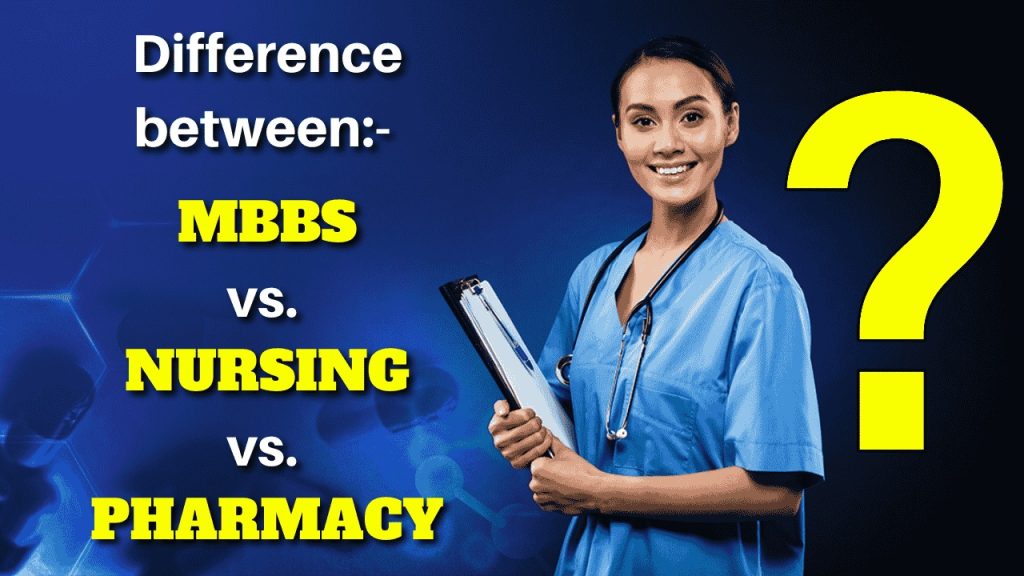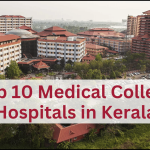
When students take medical subjects in their 12th grade, they want to know the possible career options to choose after the 12th grade. Most students want to get admission to the MBBS course, some choose the nursing course, and some students look for the Pharmacy courses.
Each course has its benefits, and the interest of the student decides the course. Some times parents cannot afford the MBBS course, and they get the admission of their children into other courses like Nursing or Pharmacy. In this article, we are going to discus the details of all of the possible courses you can go for if yu are a medical student.
1. Meaning of MBBS, Nursing, and Pharmacy
MBBS, Nursing, and Pharmacy play important roles in healthcare. Each profession has a unique purpose. Let’s check the basic definition of these courses.
- MBBS is a professional medical degree that trains students to become doctors. It includes diagnosing diseases, prescribing medicines, and performing surgeries. After the MBBS degree, students go for the MD degree in one specialization like Skin, Children, Heart, etc.
- Nursing is a profession that focuses on patient care. Nurses assist doctors, monitor patient health, and provide emotional support to patients.
- Pharmacy is the study of medicines and their effects. Pharmacists ensure the safe and effective use of drugs. They can open their shop or do the job in pharmaceutical companies.
2. Course Duration and Eligibility
Each course has a different duration and eligibility criteria.
| Profession | Duration | Eligibility |
|---|---|---|
| MBBS Course | 5.5 years (including a 1-year internship) | 10+2 with Physics, Chemistry, and Biology; NEET entrance exam required. |
| Nursing Course | 4 years for BSc Nursing, 2 years for MSc Nursing | 10+2 with Biology, Physics, and Chemistry; entrance exams may be required. |
| 10+2 with Physics, Chemistry, and Biology/and Mathematics; entrance exams may be required. | 4 years for BPharm, 2 years for MPharm | 10+2 with Physics, Chemistry, Biology/and Mathematics; entrance exams may be required. |
MBBS takes the longest time to complete. Nursing and Pharmacy require less time but still involve intensive study.
3. Subjects Studied in Each Field
Each profession covers different subjects.
- The MBBS has the subjects of Anatomy, Physiology, Pathology, Microbiology, Pharmacology, Surgery, and Medicine.
- The Nursing has the subjects of Anatomy, Physiology, Psychology, Nutrition, Medical-Surgical Nursing, and Community Health Nursing.
- The pharmacy has the subjects of Pharmaceutical Chemistry, Pharmacognosy, Pharmacology, Pharmaceutics, and Drug Regulatory Affairs.
MBBS covers a broad range of medical subjects. Nursing focuses on patient care, and Pharmacy is related to medicines.
4. Job Roles and Responsibilities
| Profession | Position | Responsibilities |
|---|---|---|
| MBBS | Doctor/Physician | Providing patient care, assisting doctors, monitoring health conditions, and giving medicines. |
| Nursing | Nurse | Dispensing medicines, advising on drug use, ensuring correct dosages, and researching new drugs. |
| Pharmacy | Pharmacist | Dispensing medicines, advising on drug use, ensuring correct dosages, researching new drugs. |
Doctors diagnose and treat illnesses. Nurses take care of patients. Pharmacists ensure safe and effective use of medicines.
5. Workplaces for Each Profession
| Profession | Common Workplaces |
|---|---|
| MBBS | Hospitals, Clinics, Private Practices, Research Institutions. |
| Nursing | Hospitals, Clinics, Nursing Homes, Community Health Centers. |
| Pharmacy | Pharmacies, Hospitals, Pharmaceutical Companies, Research Labs. |
Doctors mainly work in hospitals and clinics. Nurses are found in hospitals, nursing homes, and community health centers. Pharmacists work in medical stores, hospitals, and pharmaceutical companies.
6. Career Growth and Higher Studies
Each profession offers opportunities for higher studies.
- MBBS graduates can pursue MD (Doctor of Medicine) or MS (Master of Surgery) for specialization.
- Nurses can do an MSc Nursing or a PhD for teaching and research roles.
- Pharmacists can do an MPharm or PhD in Pharmacy for research and drug development.
Higher education improves career prospects and salary potential.
7. Salary Comparison
Salaries depend on experience, location, and job role.
| Profession | Average Salary in India | Average Salary Abroad |
|---|---|---|
| MBBS | Rs 8-12 LPA (For Freshers), Rs 15-30 LPA (For Experienced) | $80,000 – $200,000 per year |
| Nursing | Rs 3-6 LPA (For Freshers), Rs 8-15 LPA (For Experienced) | $50,000 – $120,000 per year |
| Pharmacy | Rs 3-7 LPA (For Freshers), Rs 10-20 LPA (For Experienced) | $60,000 – $140,000 per year |
Doctors earn the highest salaries. Nurses and pharmacists earn good salaries, but earnings depend on job roles and experience.
8. Advantages and Disadvantages
| Profession | Advantages | Disadvantages |
|---|---|---|
| MBBS | Long study duration, high competition, and expensive education. | Physically and emotionally demanding, shift work is required. |
| Nursing | High demand, good job security, flexible work options | Less stressful than MBBS/Nursing, a stable career |
| Pharmacy | Less stressful than MBBS/Nursing, a stable career | Limited interaction with patients, fewer job openings than MBBS. |
Doctors have high salaries but long working hours. Nurses have stable jobs but face physical and emotional challenges. Pharmacists have less stress but fewer career advancements compared to MBBS.
9. Who Should Choose Which Field?
- MBBS is ideal for those who want to become doctors, diagnose illnesses, and treat patients.
- Nursing is best for those who love patient care and want a job in hospitals or healthcare centers.
- A pharmacy is perfect for those who are interested in medicines and want to work in the pharmaceutical industry.
Each field has its unique challenges and rewards. Personal interest and passion should guide career choices.
10. Future Scope and Demand
| Profession | Future Demand |
|---|---|
| MBBS | High demand for doctors in hospitals, rural healthcare, and research. |
| Nursing | Growing demand in hospitals, elderly care, and home healthcare. |
| Pharmacy | Expanding pharmaceutical industry, research, and new drug discoveries. |
In Summary
MBBS, Nursing, and Pharmacy are the main fields a student can go for after the 12th class. It depends on your choices which course you want to go, the rank of the student, and the financial background also matter while taking admission in the medical course.








